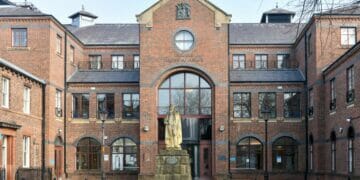
Work is continuing to upgrade Penrith’s Voreda House.
The building’s external cladding has now been removed, leaving a concrete shell.
Owned by Eden Council, the authority is refurbishing the former NHS office block to transform it into its new net zero carbon headquarters.
A spokesman said: “The council had been looking for premises to accommodate its staff and deliver services from a single site for a number of years. The acquisition of Voreda House from the NHS in July 2020 has provided an opportunity for the council to move out of its outdated and expensive to maintain Town Hall and Mansion House offices to create a new model of integrated public services with partner organisations in a fit-for-purpose modern office environment.”
He added that Voreda House had already been identified as a significant development for the UK as a leading example of the retrofit Passivhaus-standard for low and zero carbon buildings. Passivhaus is a leading international design standard, slashing energy use from buildings, while delivering high standards of comfort and wellbeing.
The work to retrofit the building involves the demolition and replacement of external cladding, the demolition of external stairs and the creation of an external service zone, together with an extension to the ground floor area to match the upper floors. Existing gas boilers will be replaced by carbon neutral electric heating, used in conjunction with 100 per cent fresh air heat recovery ventilation.
The planning statement for for Voreda House, completed by Penrith-based 2030 Architects Ltd, said: “The designs will create a major contemporary building in the centre of Penrith, which has been designed to complement the buildings in its immediate vicinity and to make a positive contribution to the environment.”
Karen Greenwood, resources portfolio holder, said: “By retrofitting Voreda House, we’ve avoided the costs, delays and disruption associated with building from scratch. We’re also creating a new, fit for purpose space for our customers, staff and partners that will be an attractive location for the new Westmorland and Furness unitary authority, which will replace Eden District Council in April 2023.
“The move to Voreda House will deliver immediate savings in excess of £190,000 per year on the operational costs associated with maintaining our existing office space in its current form, while allowing for the sale of Mansion House and the repurposing of the Town Hall as a community asset making a significant contribution to the economic and cultural fabric of Penrith and the wider area.”
Eden District Council leader Virginia Taylor, said “Even though Eden District Council will soon be part of the bigger Westmorland and Furness council, local services will still be delivered locally and residents will still need to contact their council.

“Voreda House will be a state-of-the-art building where council staff and partners can offer a one-stop shop for residents and a hub for colleagues to work together with and for the community. With fuel prices rising, this zero-carbon building will save money for council tax payers as well as helping the planet – plus, we can offer office accommodation for the additional services and jobs Local Government Reorganisation will bring to Penrith.”
Eden District Council has received £850,000 funding from the Government to make the project net zero carbon. Salix Finance, a non-departmental public body owned wholly by Government, managed the transfer of these funds to the council. Salix Finance provides 100 per cent interest-free capital for the public sector to reduce their energy costs by enabling the installation of modern, energy-efficient technologies and replacing outdated inefficient technologies.
The authority added that as part of its ongoing commitment to minimising the environmental impact of the refurbishment at Voreda House, the council is working with contractor Collinson’s Construction Ltd, to ensure that as much of the materials removed from the building are recycled as possible.
A combined total of almost 64 tonnes of waste, including plasterboard, wood, metals and general waste has been diverted from landfill and recycled. The recently removed cladding panels will also be crushed in to hardcore, to be reused on site as part of the permanent work.































